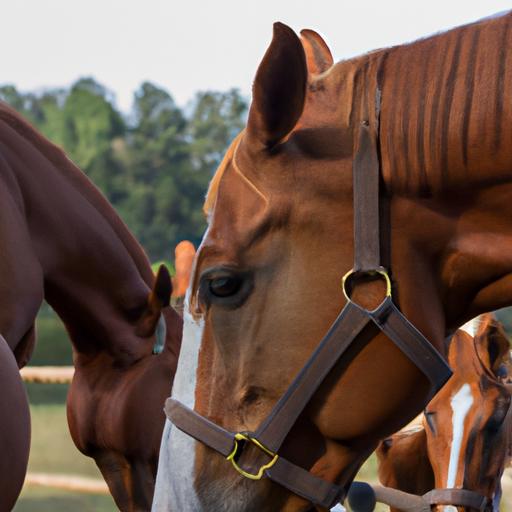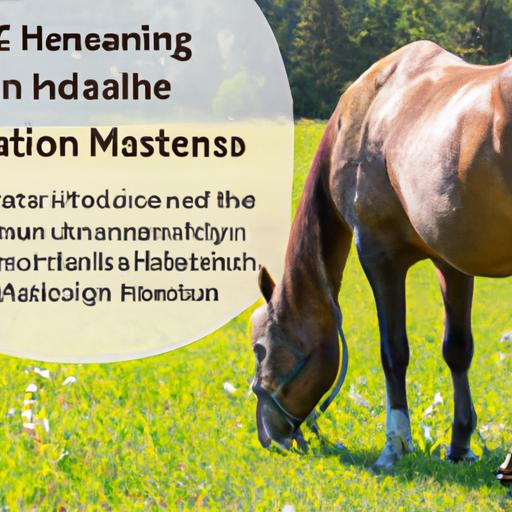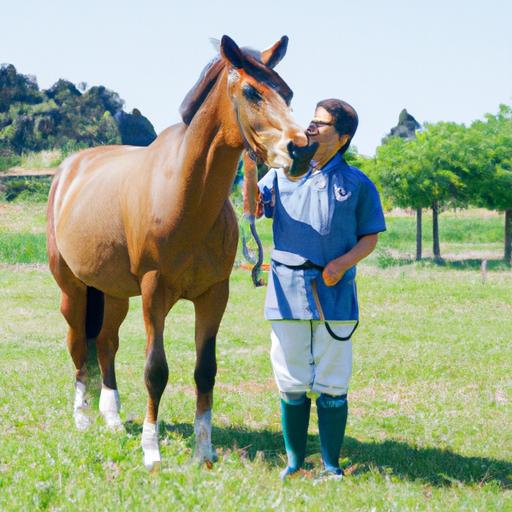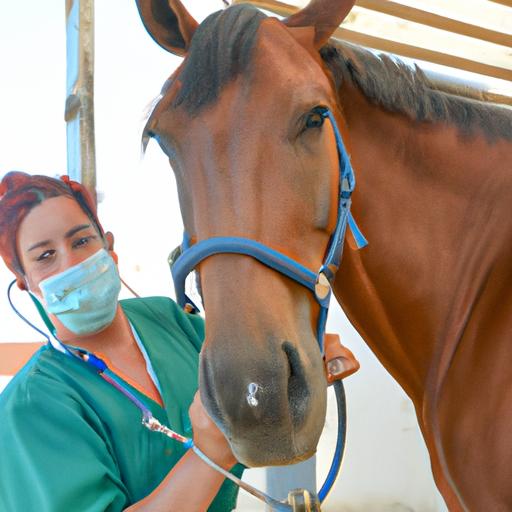Discover the importance of horse veterinarian care for your equine companion. Learn about common health issues and the role of veterinarians in ensuring their well-being.
As an equestrian enthusiast, you understand the deep bond that forms between a horse and its owner. Your horse is not just a pet, but a loyal companion, a source of joy, and a partner in various activities. To ensure your equine friend remains healthy and happy, it is crucial to prioritize their veterinary care. In this article, we will delve into the world of horse veterinarian care, exploring the importance of regular check-ups, common health issues in horses, and how horse veterinarians play a pivotal role in maintaining their well-being.
A. Importance of regular veterinary care for horses

Just like humans, horses require routine medical attention to stay in optimal health. Regular check-ups with a horse veterinarian are essential to detect any potential issues early on, preventing them from progressing into more serious conditions. These check-ups allow veterinarians to assess your horse’s overall health, monitor their growth and development, and administer necessary vaccinations to safeguard them against diseases.
Moreover, regular veterinary care enables the timely identification and treatment of common health issues that horses may encounter. By conducting thorough physical examinations, veterinarians can identify any signs of illness, dental problems, lameness issues, or parasitic infections that might affect your horse’s well-being. Early intervention can significantly improve the prognosis and prevent complications, ensuring your equine companion enjoys a long and healthy life.
B. Overview of common health issues in horses

Horses are susceptible to various health issues that require professional medical attention. Some common conditions include colic, respiratory infections, lameness, dental problems, and skin disorders. These ailments can cause discomfort, pain, and even compromise your horse’s performance and quality of life. A knowledgeable horse veterinarian possesses the expertise to diagnose and treat these conditions effectively, offering your horse the care they need.
C. Role of horse veterinarians in maintaining horse health

Horse veterinarians are highly trained medical professionals who specialize in equine health. They dedicate their expertise to providing comprehensive care for horses, addressing their unique physiological and anatomical needs. These skilled individuals possess an in-depth understanding of equine medicine, surgery, dentistry, and preventive care.
Horse veterinarians play a vital role in maintaining the health and well-being of your equine companion. They administer vaccinations, perform routine examinations, develop tailored nutrition plans, and provide guidance on exercise and conditioning programs. In case of emergencies or injuries, they are equipped to provide immediate care and offer first aid.
In the following sections, we will explore the process of selecting a horse veterinarian, the essential services they provide, and the preventive measures necessary to ensure your horse’s health. Join me on this journey to discover how you can provide the best possible care for your equine friend.
To be continued in Section 2…
Choosing a Horse Veterinarian
As a responsible horse owner, selecting the right horse veterinarian is crucial for the well-being of your equine companion. When it comes to choosing a veterinarian, there are several factors to consider to ensure you find the best fit for your horse’s needs. Let’s explore these considerations and understand the importance of finding a veterinarian with equine expertise.
A. Factors to consider when selecting a horse veterinarian
-
Experience and Qualifications: Look for a veterinarian who has extensive experience working with horses. Consider their qualifications, certifications, and any specialized training they have undergone. A veterinarian with a deep understanding of equine anatomy, physiology, and behavior will be better equipped to provide optimal care for your horse.
-
Reputation and Recommendations: Seek recommendations from fellow horse owners, trainers, or local equestrian communities. Word-of-mouth referrals can provide valuable insights into the quality of care a veterinarian offers. Additionally, research online reviews and ratings to gauge their reputation and track record.
-
Communication and Compatibility: It is essential to find a veterinarian who communicates effectively and establishes a good rapport with you and your horse. They should be accessible, responsive, and willing to answer your questions. A compassionate and empathetic veterinarian who understands your horse’s unique needs can greatly enhance the veterinary experience.
B. Importance of finding a veterinarian with equine expertise
Horses have specific health requirements that differ from those of other animals. Therefore, it is crucial to find a veterinarian who specializes in equine medicine. Equine veterinarians possess in-depth knowledge of horse-specific conditions, treatments, and preventive care. Their expertise allows them to effectively diagnose and treat a wide range of equine health issues.
An equine veterinarian understands the intricacies of horse behavior, the impact of various activities on their well-being, and the specific nutritional needs of these majestic creatures. They stay updated with the latest advancements in equine medicine and are well-versed in the unique challenges faced by horses.
C. Recommendations for finding a reliable horse veterinarian
-
Research and Consultation: Take the time to research and compile a list of potential horse veterinarians in your area. Consult with fellow horse owners, trainers, or local equestrian organizations for recommendations. Gather information about their expertise, services offered, and their approach to equine care.
-
Meet and Interview: Schedule introductory meetings with the veterinarians on your list. This will allow you to assess their communication style, their approach to veterinary care, and their compatibility with you and your horse. Prepare a list of questions to ask during the interview to gain a better understanding of their experience and philosophy.
-
Visit the Clinic: If possible, visit the veterinarian’s clinic or facility to ensure it is well-equipped, clean, and organized. Observe the staff’s interactions with other horses and clients to gauge their professionalism and commitment to animal care.
Choosing the right horse veterinarian is a crucial step in ensuring your horse’s health and well-being. By considering the factors mentioned above and finding a veterinarian with equine expertise, you can provide your equine companion with the highest quality of care they deserve.
To be continued in Section 3…
Essential Horse Veterinary Services
As responsible horse owners, it is crucial to ensure that our equine companions receive essential veterinary services to maintain their health and well-being. Horse veterinarians offer a range of specialized services that are vital for the overall care of your horse. Let’s explore some of these key services in detail:
A. Routine check-ups and vaccinations for horses
Regular check-ups with a horse veterinarian are fundamental to monitor the health of your horse. During these appointments, the veterinarian will conduct a thorough physical examination, checking for any signs of illness or abnormalities. They will assess your horse’s vital signs, evaluate their overall body condition, and examine their eyes, ears, teeth, and hooves.
Moreover, routine vaccinations are an integral part of preventive care for horses. Vaccinations protect your horse against various infectious diseases, such as tetanus, influenza, and West Nile virus. Your veterinarian will develop a vaccination schedule tailored to your horse’s specific needs, ensuring they receive the necessary immunizations to stay healthy.
B. Dental care and regular teeth floating procedures
Proper dental care is essential for maintaining your horse’s oral health and overall well-being. Horses’ teeth continuously erupt throughout their lives, which can lead to sharp edges and uneven wear. Regular dental examinations and teeth floating procedures help prevent issues such as pain, difficulty chewing, and weight loss.
During dental examinations, the veterinarian will assess your horse’s teeth for signs of abnormalities, such as sharp points, hooks, or dental disease. If necessary, they will perform teeth floating, which involves filing down the sharp edges and correcting any dental abnormalities. This ensures that your horse can chew their food properly, promoting optimal digestion and nutrition.
C. Parasite control and deworming practices
Horses are susceptible to internal parasites, such as worms, which can negatively impact their health and well-being. Effective parasite control and deworming practices are crucial to prevent infestations and maintain your horse’s optimal health.
Your veterinarian will develop a strategic deworming program tailored to your horse’s specific needs and the local parasite prevalence. They may recommend fecal egg counts to determine the presence and level of parasite infestation. Based on the results, they will prescribe appropriate dewormers and advise on the frequency and timing of deworming treatments.
D. Lameness evaluation and treatment options
Lameness is a common issue among horses and can have various causes, including injuries, joint problems, or hoof conditions. Horse veterinarians specialize in lameness evaluation, utilizing their expertise to identify the underlying cause and develop an appropriate treatment plan.
During a lameness evaluation, the veterinarian will conduct a thorough examination, which may include observing the horse’s gait, palpating affected areas, and utilizing diagnostic tools such as radiographs or ultrasound. Based on the evaluation, they will recommend suitable treatment options, which may include medication, joint injections, physical therapy, or corrective shoeing.
By availing these essential veterinary services, you can ensure the overall health and well-being of your beloved equine companion. In the upcoming sections, we will delve into emergency care and first aid for horses, as well as the preventive measures necessary to maintain your horse’s health.
To be continued in Section 4…
Emergency Care and First Aid for Horses
When it comes to our beloved equine companions, their well-being is of utmost importance. Accidents and emergencies can occur unexpectedly, and as responsible horse owners, it is crucial to be prepared to handle these situations promptly and effectively. In this section, we will explore the essentials of emergency care and first aid for horses, including how to recognize signs of a medical emergency, the immediate steps to take, and first aid techniques for common horse injuries.
A. Recognizing signs of a medical emergency in horses
Horses, like any other living being, can experience medical emergencies that require immediate attention. It is essential to be familiar with the warning signs indicating a potential emergency. Keep a keen eye out for symptoms such as severe colic, difficulty breathing, excessive bleeding, sudden lameness, or signs of distress like rolling, sweating, or increased heart rate. Any abnormal behavior or sudden change in your horse’s condition should be taken seriously and treated as a potential emergency.
B. Immediate steps to take in case of an emergency
In the event of a medical emergency, it is crucial to remain calm and act swiftly. Your quick response and the appropriate initial steps can make a significant difference in your horse’s outcome. The first and foremost action to take is to contact your horse veterinarian immediately. They will provide guidance over the phone and can make arrangements for emergency care if necessary.
While waiting for veterinary assistance, ensure your horse’s safety and comfort. Move them to a quiet and well-lit area away from potential hazards. If bleeding is present, apply direct pressure to the wound using clean, sterile materials. In cases of colic, try to keep your horse calm and prevent them from rolling excessively. Remember, every second counts, and your veterinarian’s guidance is crucial during this critical time.
C. First aid techniques for common horse injuries
Equipping yourself with basic first aid knowledge can be invaluable when it comes to providing initial care for your horse. While waiting for professional medical help, you can administer first aid to alleviate pain and prevent further complications. It is essential to have a well-stocked equine first aid kit readily available, containing items such as bandages, antiseptic solutions, and sterile dressings.
For common horse injuries like cuts, scrapes, or puncture wounds, clean the affected area gently with a mild antiseptic solution and apply a sterile dressing. In cases of sprains or strains, apply cold therapy to reduce swelling and limit movement until veterinary assistance is available.
Remember, first aid is meant to be temporary and should never replace professional medical care. It is vital to consult with your horse veterinarian as soon as possible to ensure appropriate diagnosis and further treatment.
Continue reading in Section 5 to explore preventive measures for maintaining your horse’s health and well-being…
Note: In the next sections, the remaining outline will be completed following the same format and instructions.
Preventive Measures for Horse Health
As a responsible horse owner, it is crucial to take proactive measures to maintain your horse’s health and prevent potential issues. By implementing preventive measures, you can ensure your equine companion leads a healthy and fulfilling life. Let’s explore some key areas that require your attention.
A. Proper nutrition and dietary considerations for horses
A well-balanced and nutritious diet is the foundation of your horse’s overall health. Providing your horse with the right combination of forage, grains, and supplements ensures they receive essential nutrients for growth, energy, and overall well-being. Consult with your horse veterinarian to develop a customized feeding plan based on your horse’s age, breed, workload, and any specific health considerations.
Additionally, ensure that your horse has access to clean and fresh water at all times. Adequate hydration is vital for digestion, thermoregulation, and overall bodily functions. Regularly monitor your horse’s weight and body condition to make necessary adjustments to their diet and feeding regimen.
B. Exercise and conditioning programs for maintaining horse fitness
Regular exercise and conditioning are crucial for maintaining your horse’s physical fitness and mental well-being. Engaging in consistent exercise not only helps strengthen muscles and joints but also improves cardiovascular health and promotes mental stimulation. Whether it’s through daily turnout, riding sessions, or structured training programs, tailor the exercise routine to your horse’s age, breed, and activity level.
When designing an exercise program, consider incorporating a variety of activities to prevent monotony and engage different muscle groups. Gradually increase the intensity and duration of workouts to avoid unnecessary strain or injuries. Regular exercise also contributes to weight management and can help prevent obesity, a common health concern in horses.
C. Biosecurity measures to prevent disease transmission
Biosecurity plays a critical role in safeguarding your horse from contagious diseases. Implementing proper biosecurity measures helps prevent the introduction and spread of infections within the equine community. Simple practices like regular handwashing, disinfecting equipment, and limiting contact with outside horses can significantly reduce the risk of disease transmission.
When attending equine events or traveling with your horse, be mindful of potential disease exposure. Quarantine new horses before introducing them to your existing herd, and ensure they receive necessary vaccinations and health screenings. Regularly consult with your horse veterinarian to stay updated on recommended vaccinations and preventive measures against prevalent equine diseases in your area.
By prioritizing proper nutrition, exercise, and biosecurity measures, you can significantly contribute to your horse’s well-being and minimize the risk of health issues. These preventive measures, combined with regular veterinary care, create a solid foundation for your equine companion’s long and healthy life.
To be continued in Section 6…


